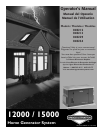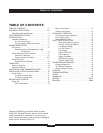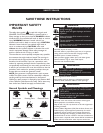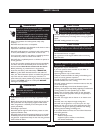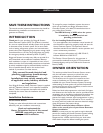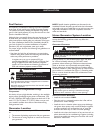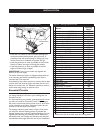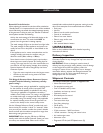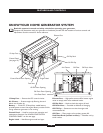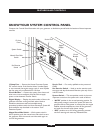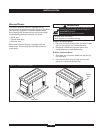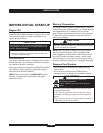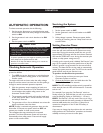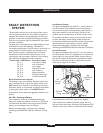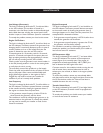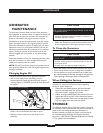
INSTALLATION
6
Fuel Factors
An important consideration affecting the entire installation
is the type of fuel used by your Home Generator System.
The system was factory tested and adjusted using natural
gas as a fuel. Liquid propane (LP) may also be used as a fuel
(see the Installation Manual).
Although there are specific factors that are inherent to each
of these fuels, your location and the duration of possible
utility interruptions should guide your selection of fuel type.
For urban installations, Natural Gas (if available) should be
your fuel of choice. For remote installations, a Liquefied
Petroleum (LP) tank might better meet your needs.
For proper engine function, the following fuel guidelines are
recommended:
• Use clean, dry fuel, free of moisture or any particulate
material. Using fuels outside the following recommended
values may cause performance problems.
In engines set up to run on propane (LP) gas,
commercial grade HD5 propane with a minimum fuel
energy of 2500 BTUs/ft
3
with maximum propylene
content of 5% and butane and heavier gas content of
2.5% and minimum propane content of 90%.
Power Decrease at High Altitude or High
Temperature
Air density is less at high altitudes, resulting in less available
engine power. Specifically, engine power will decrease 3.5%
for each 1,000 feet (300 meters) above sea level and 1% for
each 10° F (5.6°C) above 77°F (25°C). Make sure you and
your installer consider these factors when determining
total generator load.
Generator Location
The actual physical location of your HGS has a direct affect
on:
1. The amount of plumbing required to fuel your generator.
2. The amount of wiring required to control and connect
your generator.
NOTE: Specific location guidelines are discussed in the
Installation Manual.Acquaint yourself with that information
and confer with your installer. Be sure to ask how your site
might affect installation costs and compliance with local
codes and standards.
Home Generator System Location
Before installing generator, consult with homeowner and
convey the following guidelines which may affect the
desired location.
Generator Clearances
Place generator in a well ventilated area which will allow
for removal of deadly exhaust gas. DO NOT install
generator where exhaust gas could accumulate and enter
inside or be drawn into a potentially occupied building.
Ensure exhaust gas is kept away from any windows, doors,
ventilation intakes or other openings that can allow exhaust
gas to collect in a confined area (Figure 1). Prevailing winds
and air currents should be taken into consideration when
positioning generator.
General Location Guidelines
• Install the unit outdoors ONLY.
• Place the unit in a prepared location that is flat and has
provisions for water drainage.
• Install the unit in a location where sump pump discharge,
rain gutter down spouts, roof run-off, landscape irrigation,
or water sprinklers will not flood the unit or spray the
enclosure and enter any air inlet our outlet openings.
• Install the unit where the location of any services such as
phone, electrical, fuel, air conditioning, irrigation, including
covered, concealed and underground services will not be
affected or obstructed.
• The Home Generator System is equipped with an automatic
safety gas “fuel shut-off” valve.
• DO NOT operate the equipment if the “fuel shut-off” valve is
missing or inoperative.
Propane and Natural Gas is extremely
flammable and explosive.
Fire or explosion can cause severe burns or
death.
WARNING
• Operate generator ONLY outdoors.
• Keep exhaust gas from entering a confined area through
windows, doors,ventilation intakes or other openings.
Running generator gives off carbon monoxide,
an odorless, colorless, poison gas.
Breathing carbon monoxide can cause nausea,
fainting or death.
WARNING
• Keep at least 5 ft.(152 cm) clearance on all sides of generator
including overhead.
Exhaust heat/gases can ignite combustibles or
structures causing a fire.
WARNING



